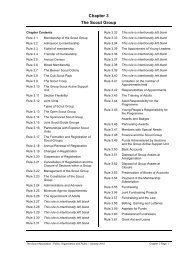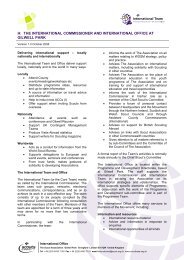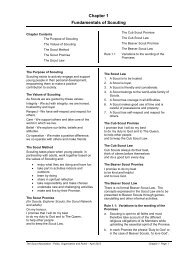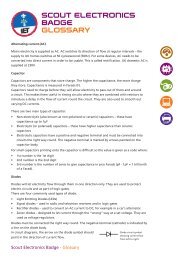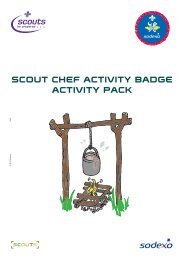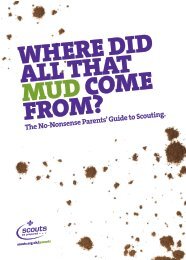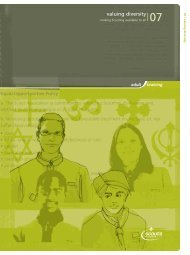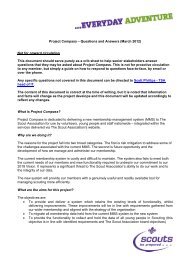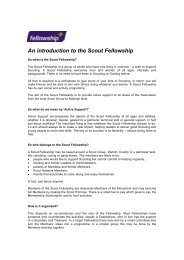SCO015/2 module 33 - The Scout Association
SCO015/2 module 33 - The Scout Association
SCO015/2 module 33 - The Scout Association
You also want an ePaper? Increase the reach of your titles
YUMPU automatically turns print PDFs into web optimized ePapers that Google loves.
the appointment process (training material)<br />
for members of appointments sub-committees
Who is <strong>The</strong> Appointment Process (Training<br />
Material) for?<br />
This material is for all Chairpersons, Secretaries and members of the<br />
Appointments sub-Committee at District and County level. It is available if<br />
people want to use it – it is not compulsory for anyone.<br />
What does this material contain?<br />
<strong>The</strong> method given shows the timings for a two-hour experience, together<br />
with suggestions for ways in which it could be extended. <strong>The</strong> session<br />
timings total 1 hour and 50 minutes, allowing 10 minutes for introductions<br />
and refreshments if required.<br />
What information is provided?<br />
This training material covers the main aspects of the role of the<br />
Appointments sub-Committee and can be delivered in a variety of ways.<br />
Information is given on the role and responsibilities of the Appointments<br />
sub-Committee. Guidelines on the planning and running of successful<br />
Appointments sub-Committee meetings are also provided.<br />
Series Editor<br />
Chris James<br />
Editors<br />
Tim Kidd<br />
Paul Williams<br />
Contributors<br />
Tim Kidd<br />
Paul Williams<br />
Design and<br />
Production<br />
<strong>The</strong> Workroom<br />
Copyright © 2004<br />
<strong>The</strong> <strong>Scout</strong> <strong>Association</strong><br />
Second edition<br />
First printed 2004<br />
Printed by Belmont Press<br />
Editor’s note<br />
Although in some parts of the British Isles <strong>Scout</strong> Counties are known as Areas or Islands and in<br />
one case Bailiwick, for ease of reading this material simply refers to County or Counties.
Session details<br />
<strong>The</strong> following sessions are included in this training material:<br />
Session Page Timing (hrs)<br />
1 What’s it all about? 4 0:20<br />
2 <strong>The</strong> appointment meeting 8 1:00<br />
3 Other responsibilities 12 0:30<br />
Depending on the number and nature of the participants, these sessions<br />
may need to be preceded by introduction and/or integration sessions.<br />
Planning considerations<br />
<strong>The</strong> Appointment Process (Training Material) is not compulsory for anyone.<br />
<strong>The</strong> decision whether or not to undertake the training lies with the<br />
Executive Committee of the relevant Appointments sub-Committee. <strong>The</strong><br />
learners will have had various roles and Appointments in <strong>Scout</strong>ing and may<br />
have been members of the Appointments sub-Committee for a number of<br />
years.<br />
Some work needs to be carried out prior to the training session as the<br />
Trainer needs to be familiar with the information given in <strong>The</strong> Appointment<br />
Process (Guidelines).<br />
<strong>The</strong> number of learners will determine your ways of working. Smaller<br />
numbers allow for one to one or individual working and sharing ideas. It is<br />
recommended that larger groups (of eight or more participants) should be<br />
split up into tutor groups, each supported by a facilitator. <strong>The</strong>se sessions<br />
could be delivered in a variety of ways, for example:<br />
• over a couple of hours informally with the members of the<br />
Appointments sub-Committee<br />
• over a couple of hours with members of the Appointments sub-<br />
Committee at a training centre<br />
• over a longer time (perhaps for a morning) to allow more time to<br />
consider some of the issues and share experiences.<br />
<strong>The</strong> appointment process (training material) 1
Trainer<br />
<strong>The</strong> appointment<br />
process (training material)<br />
Learner<br />
Aim<br />
To explain the roles and duties of the Appointments sub-Committee.<br />
Objectives<br />
<strong>The</strong>re are four overall objectives for this training material:<br />
Group<br />
1<br />
2<br />
3<br />
Describe the role of the Appointments sub-Committee.<br />
Describe the appointment process.<br />
Plan and carry out effective appointment meetings.<br />
Report back<br />
4<br />
Describe the responsibilities of the Appointments sub-Committee for:<br />
• change of Appointment<br />
• Appointment reviews<br />
• suspension of membership<br />
• cancellation of membership<br />
• the resolution of disagreements between adults.<br />
Visual aids<br />
Trainer’s notes<br />
Handout notes<br />
Timing<br />
2<br />
<strong>The</strong> appointment process (training material)
Methods<br />
<strong>The</strong> lead presenter should possess a good knowledge of the appointment<br />
process and of <strong>The</strong> Appointment Process (Guidelines). <strong>The</strong>y should have<br />
completed Modules 28, Facilitating and 29, Presenting and have some<br />
experience of an Appointments sub-Committee.<br />
A series of sessions<br />
This training material may be delivered as a series of training sessions in a<br />
variety of time settings ranging from a whole morning session on a<br />
weekend course to an informal evening meeting over the dining table.<br />
Factsheet<br />
Worksheet<br />
One to one training<br />
This training material could be delivered on a one to one basis by a Trainer,<br />
or someone who has sufficient experience to coach a candidate through<br />
the different subject areas.<br />
Resources<br />
To deliver this training material, you will need the following resources:<br />
• Copies of <strong>The</strong> Appointment Process (Guidelines)<br />
• Overhead projector (OHP) and overhead transparencies (OHTs)<br />
• Flipchart<br />
• Paper (both flipchart and A4 pads)<br />
• Pens (both normal and flipchart)<br />
• Copies of the relevant handouts.<br />
<strong>The</strong> appointment process (training material) 3
Appointments sub-committee<br />
(training material): session 1<br />
What’s it all about?<br />
For this session, you will need the following resources:<br />
• Copies of <strong>The</strong> Appointment Process (Guidelines)<br />
• Overhead projector (OHP) and overhead transparencies (OHTs)<br />
• Flipchart<br />
• Paper (both flipchart and A4 pads)<br />
• Pens (both normal and flipchart)<br />
• Copies of the relevant handouts.<br />
Trainer’s notes<br />
Explain that this session provides a quick overview of the responsibilities of<br />
the Appointments sub-Committee. Each area will be considered in more<br />
detail later.<br />
Trainer input<br />
Discuss with explanation where necessary the organisation and role of the<br />
Appointments sub-Committee. Ensure the following areas are covered and<br />
take questions and comments throughout:<br />
Organisation<br />
(Use Handout A and OHT 1 )<br />
<strong>The</strong> Appointments sub-Committee:<br />
• is a mandatory sub-committee of the District and County<br />
Executive Committees<br />
<strong>The</strong> Policy, Organisation and Rules of <strong>The</strong> <strong>Scout</strong> <strong>Association</strong> requires an<br />
Appointments sub-Committee. In a District there tends<br />
to be a lot of work given the number of Appointments that need to<br />
be considered. A County Appointments sub-Committee is likely to<br />
be less busy.<br />
• reports to the District or County Executive Committee<br />
Whilst the Appointments sub-Committee is clearly a great support to the<br />
Commissioner, it formally reports to the relevant Executive Committee.<br />
4<br />
<strong>The</strong> appointment process (training material)
This is important as it provides a path through which disagreements<br />
between the Appointments sub-Committee and the Commissioner<br />
are resolved.<br />
• requires a Chairperson, Secretary and a ‘pool’ of members<br />
Membership of the Appointments sub-Committee is a matter for the<br />
Executive to consider. This includes the appointment of the chairperson<br />
and all members of the committee. Given the volume of work that the<br />
Appointments sub-Committee undertakes, it is usually advantageous<br />
to have a separate Appointments sub-Committee Secretary from the<br />
Executive Secretary (but not mandatory). Appointing a ‘pool’ of<br />
members will make it easier to find enough people to meet prospective<br />
Appointment holders.<br />
• meets to cover various administrative activities and to meet<br />
prospective Appointment holders<br />
Most time tends to be taken up meeting prospective Appointment<br />
holders. However the committee also carries out other work which is<br />
detailed next.<br />
Role<br />
(Use Handout B/OHT 2 )<br />
<strong>The</strong> Appointments sub-Committee:<br />
• exists to take an independent view from that of the<br />
Commissioner of the suitability of an individual for an<br />
Appointment<br />
<strong>The</strong> committee must take an independent view of the person applying<br />
for an Appointment. <strong>The</strong> Appointments process is <strong>The</strong> <strong>Scout</strong><br />
<strong>Association</strong>’s method of ensuring that we use people who are most likely<br />
to be appropriate and trustworthy. It is important that the individual is<br />
aware of the role and its demands, and is considered suitable for the<br />
task.<br />
• meets candidates as required<br />
This tends to take most time and will need careful planning so that the<br />
experience is useful and friendly for both the committee and the<br />
individual.<br />
• considers applications to change Appointment<br />
Changes of Appointment must be considered by the Appointments sub-<br />
Committee (more details later).<br />
• ensures that the Group <strong>Scout</strong> Leader or relevant Commissioner<br />
reviews Appointments<br />
All Appointments must be formally reviewed as the period of<br />
Appointment ends. A review allows the individual and the line manager<br />
together to determine what should happen next (it might be to renew<br />
<strong>The</strong> appointment process (training material) 5
the Appointment, to change Appointment, or to resign from <strong>Scout</strong>ing).<br />
• considers the continuation of the suspension of an adult<br />
If an adult has been suspended from <strong>The</strong> <strong>Scout</strong> <strong>Association</strong>, the<br />
Appointments sub-Committee acting together with the Commissioner<br />
determine if a further period of suspension is appropriate.<br />
• cancels Appointments<br />
All Appointments when cancelled require Form CS to be filled in and<br />
sent to Headquarters together with the reason for cancellation. <strong>The</strong><br />
Appointments sub-Committee acting together with the Commissioner<br />
determines the reason that will be recorded.<br />
• supports the Commissioner in the resolution of disagreements<br />
between adults<br />
Unfortunately adults sometimes disagree. <strong>The</strong> Group <strong>Scout</strong> Leader or the<br />
Commissioner usually deals with disagreements. However if the<br />
disagreement results in the recommendation to cancel an Appointment,<br />
then the Appointments sub-Committee must consider this together with<br />
the Commissioner.<br />
<strong>The</strong> CRB and Headquarters enquiry process<br />
(Use Handout C/OHT 3 )<br />
Cover the process and note the following stages in particular:<br />
• <strong>The</strong> Criminal Records Bureau (CRB) form is sent to Headquarters.<br />
• Headquarters checks its internal records and returns an initial enquiry<br />
response quickly (this is the equivalent of the old CE check).<br />
• Headquarters sends the form to the Criminal Records Bureau and the<br />
CRB sends its response via Headquarters to the District or County.<br />
<strong>The</strong> enquiry process produces two responses to the District: the initial<br />
response from the <strong>Scout</strong> records and the final response from the CRB.<br />
Appointment process<br />
(Use Handout D/OHT 4 ):<br />
<strong>The</strong> process starts when an individual wishes to join the Movement. This<br />
example follows an adult who is new to <strong>Scout</strong>ing and wishes to become a<br />
Leader in a Group.<br />
<strong>The</strong> individual will meet with the Group <strong>Scout</strong> Leader and the District<br />
Commissioner (or nominee) and the application form will be signed by all<br />
three. As this is an adult new to <strong>Scout</strong>ing, the CRB form must also be<br />
completed and sent to Headquarters.<br />
6<br />
<strong>The</strong> appointment process (training material)
Once Headquarters has returned a positive initial enquiry, the adult is issued<br />
with a Provisional Appointment and the Appointments sub-Committee<br />
Secretary ensures that the County Training Manager (or Local Training<br />
Manager) is informed so that a Training Adviser can be assigned.<br />
Whilst holding the Provisional Appointment, the adult undertakes the<br />
Getting Started <strong>module</strong>s from the Adult Training Scheme, and meets with<br />
the Appointments sub-Committee, which decides whether they feel the<br />
adult is suitable for Appointment. This phase of the process must be<br />
completed within five months. If this does not happen, the adult’s line<br />
manager may authorise a further, single renewal of the Provisional<br />
Appointment for an additional five months.<br />
<strong>The</strong> adult will only have the Appointment confirmed once it has been<br />
approved by the Appointments sub-Committee, the Getting Started<br />
<strong>module</strong>s have been completed and the CRB has returned a clear disclosure.<br />
Once all these stages are complete, the Appointments sub-Committee<br />
Secretary either issues a local Certificate of Appointment or notifies<br />
Headquarters to request a Warrant.<br />
<strong>The</strong> appointment process (training material) 7
<strong>The</strong> appointment process<br />
(training material): session 2<br />
<strong>The</strong> appointment meeting<br />
For this session, you will need the following resources:<br />
• Copies of <strong>The</strong> Appointment Process (Guidelines)<br />
• Overhead projector (OHP) and overhead transparencies (OHTs)<br />
• Flipchart<br />
• Paper (both flipchart and A4 pads)<br />
• Pens (both normal and flipchart)<br />
• Copies of the relevant handouts.<br />
Prior to the meeting<br />
Trainer’s notes<br />
Brainstorm the activities that the Appointments sub-Committee needs to<br />
carry out before meeting a prospective Appointment holder.<br />
Trainer input<br />
Expect to cover at least the following:<br />
• Check the application form is complete and correct<br />
• Obtain references<br />
It is essential to have the references before the committee can take a<br />
balanced view of the Appointment. Obtaining the references before the<br />
meeting gives the committee a chance to consider if particular areas<br />
should be explored at the meeting. It can be time consuming and<br />
difficult to obtain the necessary references – so allow plenty of time.<br />
• Invite the prospective Appointment holder<br />
This is best carried out by telephone rather than simply in a formal letter<br />
(which may make the applicant feel apprehensive) or by e-mail (which<br />
might not get there or be read in time).<br />
• Ensure that sufficient committee members can attend<br />
<strong>The</strong>re is no need for every Appointments sub-Committee member to<br />
attend every meeting – indeed it is best to have more people than<br />
necessary so that there is more chance of getting enough people<br />
together on a given date. Remember that this is an independent view<br />
8<br />
<strong>The</strong> appointment process (training material)
from the Group <strong>Scout</strong> Leader and Commissioner and so neither should<br />
attend the meeting, although they might be around to welcome the<br />
person and settle them down.<br />
• Arrange a venue<br />
<strong>The</strong> setting should feel informal and friendly as the idea is to find out<br />
about the person – not to hold an interrogation! Someone’s sitting room<br />
with tea, coffee and biscuits available is ideal.<br />
At the meeting<br />
Task<br />
In buzz groups, draw up an outline agenda for the meeting with a<br />
prospective Appointment holder.<br />
Report back<br />
Consider the agendas and offer the following outline suggestion:<br />
a) Make introductions.<br />
b) Explain the purpose of the meeting.<br />
c) Hold a discussion covering the areas the committee wishes to consider.<br />
d) Cover any questions that the candidate wishes to ask.<br />
e) Explain when the candidate will be informed of the outcome and thank<br />
the candidate for attending.<br />
After the candidate has left, the committee will consider the<br />
recommendations, which will be given to the Commissioner at the earliest<br />
opportunity (and certainly within a couple of days).<br />
<strong>The</strong> meeting with the prospective Appointment holder should last between<br />
20 and 40 minutes.<br />
Trainer input<br />
Cover the three main areas that the committee will need to consider when<br />
judging the suitability of an individual:<br />
<strong>The</strong> appointment process (training material) 9
• Personal qualities: a person’s individual characteristics and personality<br />
such as a sense of humour.<br />
• Functional qualities: a person’s ability to do a particular job using the<br />
skills and qualities they have such as leadership skills.<br />
• Personal values and faith: a person’s commitment to the underlying<br />
values of <strong>The</strong> <strong>Scout</strong> <strong>Association</strong>:<br />
- Duty to Self: being trustworthy, self-confident, self-controlled and<br />
having self-respect<br />
- Duty to Others: respecting others, working to serve other people,<br />
working to improve society, respecting the natural world and<br />
- Duty to God: carrying into daily practice the principles of religious<br />
faith or belief, accepting that there is a higher being.<br />
Task<br />
Using two flipcharts (one headed ‘Personal qualities’ and the other headed<br />
‘Functional qualities’) ask people to write up items that the Appointments<br />
sub-Committee might look for under each heading. Discuss the results.<br />
Expect the lists to include:<br />
Personal qualities<br />
• positive attitude<br />
• forward looking<br />
• keenness<br />
• enthusiasm<br />
• sense of humour<br />
• initiative<br />
• reliability<br />
• tolerance<br />
• honesty<br />
• realistic approach<br />
• successful relationships with adults and young people.<br />
Functional qualities<br />
• practical skills<br />
• organisational skills<br />
• team player<br />
• leadership qualities<br />
• empathy with the age range<br />
• maturity<br />
• communication skills<br />
• ability to learn new skills.<br />
10<br />
<strong>The</strong> appointment process (training material)
Report back<br />
Discuss how the questions should be handled when meeting a prospective<br />
Appointment holder.<br />
Trainer’s notes<br />
If this training is being run over half a day rather than an evening, it might<br />
be useful to run a role-play of a meeting with a prospective Appointment<br />
holder. <strong>The</strong> participants could play the role of the Appointments sub-<br />
Committee and a member of the training staff could play the role of the<br />
perspective Appointment holder. After the role-play, ask for feedback from<br />
each participant in the role play and then from those observing. Draw out<br />
lessons for good meetings, using Handout E.<br />
Administration<br />
Trainer input<br />
Using samples of the Adult Application Form (AA), the Reference Form (RF)<br />
and the Criminal Records Bureau Form (CRB). Explain what each contains<br />
and the issues to be considered when filling them in.<br />
Task<br />
Come up with a list of records that the Appointments sub-Committee<br />
should keep. Expect to include at least the:<br />
• names and contact details of people met<br />
• dates of meetings, who was seen and the recommendation made from<br />
that meeting<br />
• Appointments recommended including the starting date of the<br />
Appointment and the length of the Appointment (the next review date)<br />
• issue of Provisional Appointments<br />
• issue of full Appointments and Warrants<br />
• conclusion of the Getting Started <strong>module</strong>s.<br />
<strong>The</strong> <strong>Scout</strong> <strong>Association</strong> publishes an Adult Record Card that may be kept by<br />
the Appointments sub-Committee.<br />
<strong>The</strong> appointment process (training material) 11
<strong>The</strong> appointment process<br />
(training material): session 3<br />
Other responsibilities<br />
Trainer’s notes<br />
Describe the responsibilities of an Appointments sub-Committee. Pause for<br />
questions and comments as and when necessary.<br />
Trainer input<br />
Explain the responsibilities of an Appointments sub-Committee with respect<br />
to the following:<br />
Appointment reviews<br />
It is important to understand that the Appointment sub-Committee does<br />
not actually undertake the review but prompts the relevant line manager<br />
(Commissioner) into ensuring that they happen. <strong>The</strong>re are a number of<br />
reviews that could take place, for example:<br />
• a one to one with two <strong>Scout</strong>ers<br />
• a Group <strong>Scout</strong> Leader with a Section Leader<br />
• a District Commissioner with a Group <strong>Scout</strong> Leader/Assistant District<br />
Commissioner/District Explorer <strong>Scout</strong> Commissioner<br />
• a County Commissioner with a District Commissioner/Assistant County<br />
Commissioner/County <strong>Scout</strong> Network Commissioner and so on.<br />
<strong>The</strong> Appointments sub-Committee supports the Commissioner in their<br />
decision as to whether a person is suitable for the role and advises them as<br />
appropriate.<br />
<strong>The</strong> process for formal review involves the Appointments sub-Committee as<br />
follows:<br />
a) <strong>The</strong> Appointments sub-Committee secretary sends Form AR to the line<br />
manager who will carry out the review. <strong>The</strong> form should be sent three<br />
months before the review is due.<br />
b) <strong>The</strong> Appointments sub-Committee secretary notifies the appointment<br />
holder that the review is due.<br />
c) <strong>The</strong> line manager carries out the review and records the details on Form<br />
12<br />
<strong>The</strong> appointment process (training material)
AR and returns it to the Appointments sub-Committee secretary.<br />
d) <strong>The</strong> District Commissioner and Appointments sub-Committee consider<br />
the completed Form AR and reach a decision on the review of the<br />
Appointment.<br />
Change of Appointment<br />
Many people undertake a number of different roles in <strong>Scout</strong>ing. At some<br />
stage, certain people may have to hold more than one Appointment to<br />
cover the gap left when a colleague leaves. An example of this is when a<br />
County Commissioner becomes a stand-in District Commissioner until a<br />
replacement is found. <strong>The</strong>re are two main ways to change an Appointment.<br />
First, for those who are changing within a Section (e.g. a <strong>Scout</strong> Leader to<br />
an Assistant <strong>Scout</strong> Leader) the Appointments sub-Committee has the choice<br />
whether to see you or not. An adult would not need to go through the<br />
whole Appointment process although records must be kept. Secondly, there<br />
are the changes outside Sectional constraints. This would involve a<br />
complete change in Appointment (e.g. a <strong>Scout</strong> Leader becoming the Group<br />
<strong>Scout</strong> Leader). In these instances, the Appointments sub-Committee has the<br />
right to see the adult but would not necessarily do so in every case. It<br />
should be noted also that where appropriate the Records Manager at<br />
Headquarters might need to be notified of certain changes in Appointment.<br />
Suspension<br />
It is important to state that the responsibility for suspensions in <strong>Scout</strong>ing<br />
does not lie in the hands of the Appointments sub-Committee. It is the<br />
responsibility of the relevant Commissioner (with the approval of the<br />
County or Chief Commissioner as required) to suspend someone from<br />
activity within the Movement. Suspension may only occur after an alleged<br />
criminal offence, a disagreement between two parties or when the actions<br />
of the individual could seriously harm the reputation of <strong>Scout</strong>ing. <strong>The</strong> work<br />
of the Appointments sub-Committee is to support the Commissioner in<br />
dealing with the consequences of suspending an adult from <strong>Scout</strong>ing. It<br />
does not have a formal role to play in the suspension. However, the<br />
Appointments sub-Committee does have a role to play in the conclusion of<br />
the suspension. This is where the Committee’s experience in dealing with<br />
confidential records and matters of personal prejudice come into play.<br />
<strong>The</strong> appointment process (training material) 13
Cancellation<br />
<strong>The</strong> Appointments sub-Committee has a major role to play in the<br />
cancellation of Warrants and membership of the Movement. <strong>The</strong><br />
Appointments sub-Committee, working alongside the Commissioner may<br />
cancel or not renew any local Appointment or recommend to Headquarters<br />
that a Warrant be cancelled or not renewed on one or more of the<br />
following grounds, that:<br />
• the appointee acquiesces when notified that a recommendation is to be<br />
made for the cancellation or non-renewal of the Appointment<br />
• the appointee is not within the age limits prescribed for the<br />
Appointment<br />
• the appointee has failed within the time limits to satisfactorily complete<br />
Adult Training appropriate to the Appointment<br />
• the Appointment is not to be renewed following review<br />
• the appointee has ceased or failed to perform the duties of the<br />
Appointment satisfactorily<br />
• it becomes evident that the appointee no longer accepts the<br />
fundamental principles of the Movement<br />
• it becomes evident that the appointee is not a ‘fit and proper’ person in<br />
respect of <strong>The</strong> <strong>Scout</strong> <strong>Association</strong>’s policies and rules<br />
• the appointee is likely to bring <strong>The</strong> <strong>Scout</strong> <strong>Association</strong>’s name into<br />
disrepute<br />
• the Appointment should be terminated following the closure of a Group<br />
or a Section within a Group.<br />
In exceptional circumstances, Headquarters may, in consultation with the<br />
responsible District or County Commissioner, cancel or refuse to renew a<br />
Warrant.<br />
Further to this, the cancellation of Administrators and Adviser<br />
Appointments is carried out by the Group <strong>Scout</strong> Leader/District<br />
Commissioner/County Commissioner and the Executive Committee, acting<br />
together on one or more of the following grounds:<br />
• the Appointment when notified that a recommendation is to be made<br />
for the cancellation of the Appointment<br />
• the Appointment is not to be renewed when reviewed<br />
• it becomes evident that the appointee no longer accepts the<br />
fundamental principles of the Movement<br />
• it becomes evident that the person is not ‘fit and proper’ to carry out<br />
their duties on behalf of the council (Group/District/County).<br />
In exceptional circumstances Headquarters may, in consultation with<br />
the responsible District or County Commissioner, cancel or refuse to<br />
renew a Warrant.<br />
14<br />
<strong>The</strong> appointment process (training material)
Resolution of disagreements between adults<br />
As in any walk of life, disagreements sometimes occur between adults in<br />
<strong>Scout</strong>ing. <strong>The</strong> most important role for the Appointments sub-Committee is<br />
not to investigate the disputes but to act as a support mechanism for the<br />
Commissioner. <strong>The</strong> Appointments sub-Committee would need to consider<br />
the findings of a conciliator to decide whether the Warrant or Appointment<br />
of the person under investigation should be terminated.<br />
Summary<br />
End the session by thanking the participants for their work and thoughts. It<br />
is also a good idea at this point to mention the Yearly Diary Planner. (See<br />
handout G for an example). <strong>The</strong> participants are invited to use this diagram<br />
as a template for their workload over the year as an Appointments sub-<br />
Committee. It shows the things that you should prepare for and the sort of<br />
questions that could be asked.<br />
<strong>The</strong> appointment process (training material) 15
HO A<br />
Organisation of the<br />
Appointments sub-Committee<br />
<strong>The</strong> Appointments sub-Committee:<br />
• is a mandatory sub-Committee of the District and County<br />
Executive Committees<br />
• reports to the District or County Executive Committee<br />
• requires a Chairperson, Secretary and a ‘pool’ of members<br />
• meets to cover various administrative activities and to interview<br />
prospective Appointment holders.<br />
<strong>The</strong> appointment process (training material)
HO B<br />
Role of the Appointments<br />
sub-Committee<br />
<strong>The</strong> Appointments sub-Committee:<br />
• exists to take an independent view from that of the Commissioner,<br />
of the suitability of an individual for an Appointment<br />
• interviews candidates as required<br />
• considers applications for change of Appointment<br />
• ensures that the Group <strong>Scout</strong> Leader or relevant Commissioner<br />
reviews Appointments<br />
• considers the continuation of the suspension of an adult<br />
• cancels Appointments<br />
• supports the Commissioner in the resolution of disagreements<br />
between adults.<br />
<strong>The</strong> appointment process (training material)
<strong>The</strong> appointment process (training material)<br />
Form is checked by a<br />
Registered Signatory at HQ<br />
before sending to the CRB<br />
Applicant<br />
CRB<br />
Disclosure sent<br />
Headquarters Records Department<br />
District or County<br />
Applicant<br />
District or County<br />
Records Department, HQ<br />
Records<br />
Department, HQ<br />
HQ CE Check<br />
Supply of forms sent<br />
to District, County<br />
Applicant completes form with<br />
help of local <strong>Scout</strong>ing personnel<br />
ID checked by District, County and<br />
form sent on with Declaration<br />
Sheet, signed by the person<br />
checking the documentation<br />
A check is also made using<br />
<strong>The</strong> <strong>Scout</strong> <strong>Association</strong>’s<br />
Confidential Index<br />
HO C <strong>The</strong> Criminal Records Bureau and<br />
Headquarters enquiry process<br />
District or County<br />
Confirmation clearance<br />
sent to District
<strong>The</strong> appointment process (training material)<br />
Appointments<br />
sub-Committee & DC<br />
Application form<br />
complete<br />
HQ initial enquiry clear<br />
Provisional Appointment issued<br />
& Training Adviser assigned<br />
Individual<br />
Getting Started<br />
Appointment<br />
Presented<br />
CRB Form Complete<br />
CRB Form sent to CRB<br />
CRB disclosure clear<br />
HO D <strong>The</strong> appointment of adults
HO E<br />
Asking questions in the<br />
Appointments meeting<br />
For an Appointments sub-Committee to be effective, the Appointments<br />
meeting must cover the main areas the committee needs to consider when<br />
making a decision:<br />
• Personal qualities: a person’s individual characteristics and personality<br />
such as a sense of humour.<br />
• Functional qualities: a person’s ability to do a particular job through<br />
the skills and the qualities they have, such as leadership qualities.<br />
• Personal values and faith: a person’s commitment to the underlying<br />
values of <strong>The</strong> <strong>Scout</strong> <strong>Association</strong>:<br />
• Duty to Self: being trustworthy, self-confident, self-controlled and<br />
having self-respect<br />
• Duty to Others: respecting others, working to serve other people,<br />
working to improve society, respecting the natural world<br />
• Duty to God: carrying into daily practice the principles of religious<br />
faith or belief, accepting that there is a higher being.<br />
In general, ‘open questions’ are more useful as they allow more information<br />
to be gained from the adult. Open questions use words such as ‘why’,<br />
‘how’, ‘who’, ‘what’ and ‘if’. <strong>The</strong>y are questions to which a simple ‘yes’ or<br />
‘no’ is not appropriate. This style of question will allow the committee to<br />
find out more about the adult’s views, opinions and motivation behind their<br />
offer to help.<br />
At times, ‘closed questions’ will be useful. <strong>The</strong>se are questions which only<br />
leave the option of a ‘yes’ or ‘no’ answer. This style of question will be<br />
useful if the committee needs to clarify the adult’s view or explanation. For<br />
example, ‘Do you agree with X?’<br />
At all times it is important to avoid questions where the questioner puts<br />
forward his or her opinion. For example, ‘I think that <strong>Scout</strong>s should never<br />
be allowed to camp on their own, do you agree?’ <strong>The</strong> idea of the<br />
Appointments meeting is to find out the adult’s views. This style of<br />
questioning can easily put people off and cause them just to agree with<br />
you rather than expressing their own views.<br />
It is important to plan who will ask about which area so that the meeting<br />
flows well and people do not cover the same ground.<br />
<strong>The</strong> appointment process (training material)
HO F<br />
Other responsibilities of the<br />
Appointments sub-Committee<br />
Appointment reviews<br />
• One to ones: GSL:Section Leader/DC:GSL/CC:DC and so on<br />
• <strong>The</strong> Appointments sub-Committee needs to prompt the Commissioner<br />
into carrying out reviews.<br />
• <strong>The</strong> Appointments sub-Committee does not carry out reviews itself.<br />
Change of Appointment<br />
• <strong>The</strong> committee is only used in cases of difficulty.<br />
• <strong>The</strong> committee has no need to intervene within a Section.<br />
• <strong>The</strong> committee has a right to see the adult if outside a Section.<br />
Suspension<br />
• <strong>The</strong> Appointment sub-Committee does not have the right to suspend<br />
anyone – only the appropriate Commissioner can authorise a<br />
suspension.<br />
• It is the Appointments sub-Committee’s role to facilitate the<br />
Commissioner’s decision-making process and to support them in their<br />
judgement.<br />
Cancellation<br />
• <strong>The</strong> role is to support the Commissioner and to advise on the resulting<br />
outcome.<br />
Resolution of disagreements between adults<br />
• Do not investigate but do support the conciliator.<br />
<strong>The</strong> appointment process (training material)
HO G<br />
Example Yearly Diary Planner<br />
This is an example of how the meetings for an Appointments sub-<br />
Committee could be organised during the year.<br />
NEW YEAR’S DAY<br />
DEC<br />
JAN<br />
NOV<br />
FEB<br />
OCT<br />
MAR<br />
APR<br />
SEPT<br />
AUG<br />
MAY<br />
JULY<br />
JUNE<br />
Date reserved in the diary. (Possibly for meetings with prospective<br />
Appointment holders. More (or less) may be required to deal with the<br />
actual flow of Appointments.)<br />
Meeting between the District Commissioner, Appointments Secretary,<br />
Appointments sub-Committee Chairperson, relevant Training Manager<br />
(plus a few other members of the Appointments sub-Committee if<br />
possible) to process routine cancellations and plan specific actions<br />
as noted.<br />
One of these meetings (in September for example) could be to plan all<br />
reviews. Another (perhaps in November) could take place to identify and<br />
inform those individuals who need a review in the following year. Letters<br />
could then be sent to line managers/individuals and the Appointments sub-<br />
Committee Secretary.<br />
<strong>The</strong> appointment process (training material)
<strong>The</strong> appointment process (training material)<br />
1<br />
Organisation of the Appointments sub-Committee<br />
<strong>The</strong> Appointments sub-Committee:<br />
• is a mandatory sub-Committee of the District and County<br />
Executive Committees<br />
• reports to the District or County Executive Committee<br />
• requires a Chairperson, Secretary and a ‘pool’ of members<br />
• meets to cover various administrative activities and to<br />
interview prospective Appointment holders.<br />
© <strong>The</strong> <strong>Scout</strong> <strong>Association</strong>
<strong>The</strong> appointment process (training material) 2<br />
Role of the Appointments sub-Committee<br />
<strong>The</strong> Appointments sub-Committee:<br />
• exists to take an independent view from that of the Commissioner,<br />
of the suitability of an individual for an Appointment<br />
• interviews candidates as required<br />
• considers applications for change of Appointment<br />
• ensures that the Group <strong>Scout</strong> Leader or relevant Commissioner<br />
reviews Appointments<br />
• considers the continuation of the suspension of an adult<br />
• cancels Appointments<br />
• supports the Commissioner in the resolution of disagreements<br />
between adults.<br />
© <strong>The</strong> <strong>Scout</strong> <strong>Association</strong>
<strong>The</strong> appointment process (training material)<br />
3<br />
<strong>The</strong> Criminal Records Bureau and<br />
Headquarters’ enquiry process<br />
Headquarters Records Department<br />
District or County<br />
Supply of forms sent<br />
to District, County<br />
Form is checked by a<br />
Registered Signatory at HQ<br />
before sending to the CRB<br />
Applicant<br />
District or County<br />
Records Department, HQ<br />
Applicant completes form with<br />
help of local <strong>Scout</strong>ing personnel<br />
ID checked by District, County and<br />
form sent on with Declaration<br />
Sheet, signed by the person<br />
checking the documentation<br />
CRB<br />
Disclosure sent<br />
HQ CE Check<br />
A check is also made using<br />
<strong>The</strong> <strong>Scout</strong> <strong>Association</strong>’s<br />
Confidential Index<br />
Applicant<br />
Records<br />
Department, HQ<br />
District or County<br />
Confirmation clearance<br />
sent to District<br />
© <strong>The</strong> <strong>Scout</strong> <strong>Association</strong>
<strong>The</strong> appointment process (training material) 4<br />
<strong>The</strong> appointment of adults<br />
Individual<br />
Application form<br />
complete<br />
CRB Form Complete<br />
HQ initial enquiry clear<br />
CRB Form sent to CRB<br />
Provisional Appointment issued<br />
& Training Adviser assigned<br />
Appt sub-Comm & DC<br />
Getting Started<br />
CRB disclosure clear<br />
Appointment<br />
presented<br />
© <strong>The</strong> <strong>Scout</strong> <strong>Association</strong>
<strong>The</strong> appointment process (training material)<br />
5<br />
Asking questions in the Appointments meeting<br />
In order to make an informed decision the committee needs to:<br />
• discover the adult's personal qualities<br />
• discover the adult's functional qualities<br />
• discover the adult's personal values and faith<br />
• use open questions to find out more information<br />
• use closed questions to clarify the adult’s view or explanation<br />
• avoid stating the committee's view so as to prejudice answers<br />
• plan who will ask about what.<br />
© <strong>The</strong> <strong>Scout</strong> <strong>Association</strong>
<strong>The</strong> appointment process (training material)<br />
6<br />
Other responsibilities of the Appointments sub-Committee<br />
• Appointment reviews<br />
• Change of Appointment<br />
• Suspension<br />
• Cancellation<br />
• Resolution of disagreements between adults<br />
© <strong>The</strong> <strong>Scout</strong> <strong>Association</strong>




